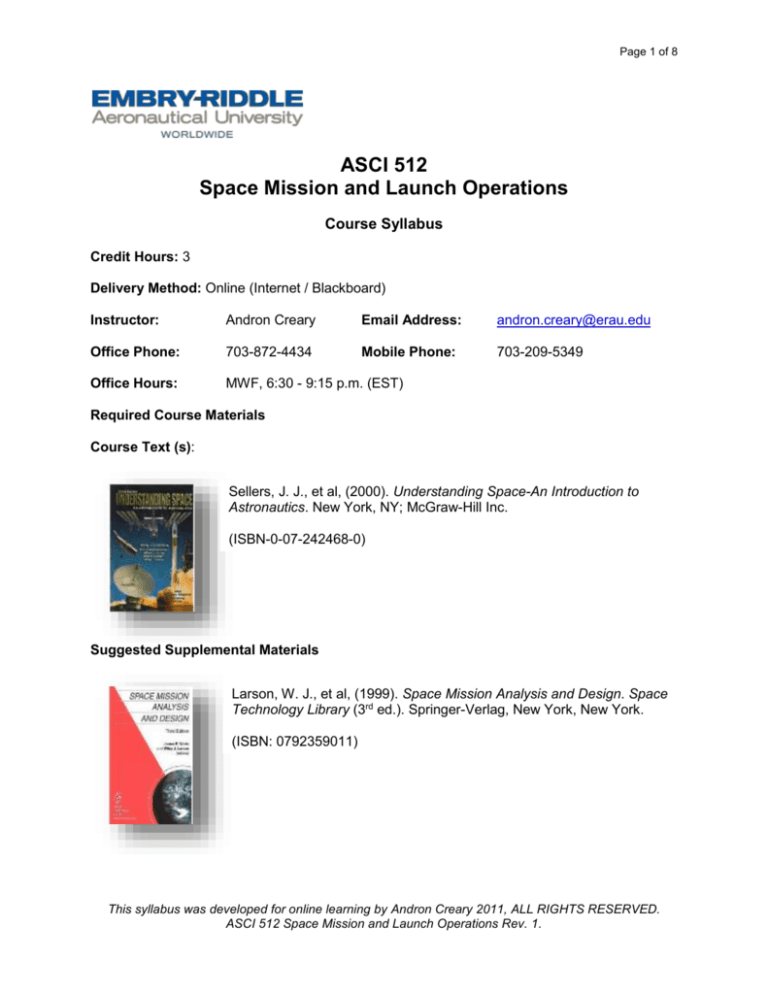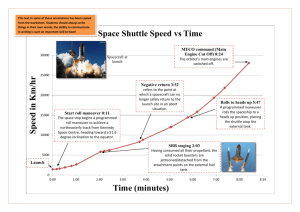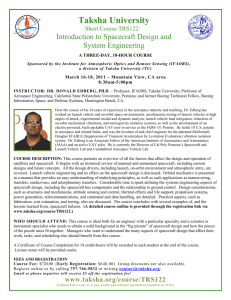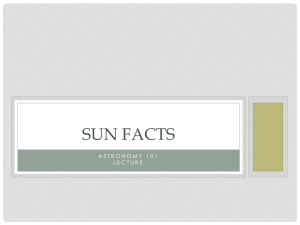
Page 1 of 8
ASCI 512
Space Mission and Launch Operations
Course Syllabus
Credit Hours: 3
Delivery Method: Online (Internet / Blackboard)
Instructor:
Andron Creary
Email Address:
andron.creary@erau.edu
Office Phone:
703-872-4434
Mobile Phone:
703-209-5349
Office Hours:
MWF, 6:30 - 9:15 p.m. (EST)
Required Course Materials
Course Text (s):
Sellers, J. J., et al, (2000). Understanding Space-An Introduction to
Astronautics. New York, NY; McGraw-Hill Inc.
(ISBN-0-07-242468-0)
Suggested Supplemental Materials
Larson, W. J., et al, (1999). Space Mission Analysis and Design. Space
Technology Library (3rd ed.). Springer-Verlag, New York, New York.
(ISBN: 0792359011)
This syllabus was developed for online learning by Andron Creary 2011, ALL RIGHTS RESERVED.
ASCI 512 Space Mission and Launch Operations Rev. 1.
Page 2 of 8
American Psychological Association. (2010). Publication manual of the
American Psychological Association (6th ed.). Washington,
DC: Author.
(ISBN: 978-1-4338-0561-5)
Click here for the APA website
Course Description
This course introduces the student to launch, mission operations, and facilities for manned and
unmanned missions at U.S and foreign sites. Satellite and spacecraft launch facility system
discussion covers safety, meteorology, communications and tracking, and navigation and
control systems. Examples of mission control, operations, and systems include spacecraft
project description, and control site operations. Computer-based simulation instruction provides
mission and site-specific operation detail. Additionally, students will explore principles of space
navigation and the space environment and its interactions with orbiting bodies.
Prerequisites
Senior or graduate standing. This course covers material from a variety of technical disciplines.
There may be areas you have never seen before. We will briefly review the material in each
area. Everything that you will need to do the homework will be given. If you are seeing this
material for the first time, you may need additional resources. You are encouraged to obtain
undergraduate level materials (notes from friends, textbooks, exams, etc.) to use as references,
additional information, and for additional example problems. Graduate level materials are often
too detailed and you may find them confusing.
Prerequisite course (s):
Math 142, Trigonometry or equivalent
Math 140, College Algebra or equivalent
Math 102, Exploration in Physics or equivalent
Course Goals
Provide an overview of the space environment, space mission design and planning, spacecraft
products and an introduction to orbital mechanics and space navigation. The topics covered will
include: the space environment; spacecraft launch, mission, and entry operations; orbital
mechanics; spacecraft systems and sub-systems and design: systems engineering and project
management as applied to spacecraft design and operations; and the future of space operations
(to include military applications, commercial applications, and planetary exploration). Both
manned and unmanned systems and operations will be discussed.
Learning Outcomes
Upon successful completion of this course, the student will be able to:
This syllabus was developed for online learning by Andron Creary 2012, ALL RIGHTS RESERVED.
ASCI 512 Space Mission and Launch Operations Rev. 1.
Page 3 of 8
1. Understand the space environment and its impact both upon space mission, spacecraft
design and operations.
2. Understand the basics of orbital mechanics as related to manned and unmanned space
operations, including fundamental physical laws governing orbital mechanics,
rendezvous and proximity operations, and interplanetary trajectories.
3. Understand the operating principles behind spacecraft systems and sub-systems.
4. Understand the operational aspects of launch windows, ascent trajectories, and entry
trajectories, as well as spacecraft design issues related to launch and entry operations.
5. Understand the process of designing spacecraft, including general project management
and systems engineering. Also, operational considerations in spacecraft design,
performance, and cost issues.
6. Understand the operational issues involved in planning and conducting spacecraft
mission operations
7. Understand the future direction of spacecraft operations, including military and
commercial activities. Also, understand the future of manned and unmanned planetary
exploration activities.
8. Have the ability to integrate all the learning objectives of the course in order to effectively
contribute to and/or manage activities related to spacecraft operations.
Grading
These are the major assignments in the course and will be the basis for evaluation according to
the grading scale shown in the table below.
Course Grade Scale
Evaluation Items & Weights
90% -100%
A
Discussion Threads
10%
80% - 89%
B
Homework
20%
70% - 79%
C
Mid-Term Exam
20%
0% - 69%
F
Research Paper
25%
Final Exam
25%
Total
100%
This syllabus was developed for online learning by Andron Creary 2012, ALL RIGHTS RESERVED.
ASCI 512 Space Mission and Launch Operations Rev. 1.
Page 4 of 8
Points System
Discussion Threads
=
10 points
Homework
=
20 points
Mid-Term Exam
=
20 points
Research Paper
=
25 points
Final Exam
=
25 points
Additional Information
Email: Communication by email is welcome and encouraged. It is a reliable and easy method
for communicating with distant folks (students and instructor), as well as providing a saved
transcript. A class email list will be established for sending out information between lectures.
Sometimes there are errors in the homework questions, missing information, or several students
may ask the same clarification question. In those cases I will email everyone corrections and or
hints. You may have as many email addresses on the list as you would like (home, work, etc.).
The address will not be shared with everyone else.
TA: This class will not have a teaching assistant. I will be available for questions and homework
help during office hours.
Emby-Riddle Blackboard: Blackboard is the University’s online learning system. Our class will
contain the notes for each lecture, the homework assignments, the homework and exam
solutions, and annotated lecture notes from each class session. The class web site is available
to both on-campus and off-campus students. It is the responsibility of the student to ensure
their Embry-Riddle Blackboard account is active and that they are enrolled in the correct course.
Technical support is available to the Embry-Riddle community 24 hours a day, every day.
Contact them at the information below to help with any Blackboard issues.
Contact Us
IT Support Self-service Create a new request or incident, track the status of existing
requests and incidents, or search the knowledge-base.
Online Chat
Use our Online Chat service to chat live with a technical support person. This service
can also allow the use of remote access where the support person, with your
permission, can access your desktop to assist you with your problem.
Daytona Beach: 386-226-6990
Prescott: 928-777-6990
Worldwide: 866-227-8325
Email: ITSupport@erau.edu
Library: Embry-Riddle Aeronautical University has one of the most complete library collections
of aviation-related resources in the world.
Click here for ERAU Libraries
Hunt Library Worldwide: Information, Services, Help
o Worldwide Library: Basic Training
o Worldwide Library: Ask-a-Librarian
o Reference: Research Request
This syllabus was developed for online learning by Andron Creary 2012, ALL RIGHTS RESERVED.
ASCI 512 Space Mission and Launch Operations Rev. 1.
Page 5 of 8
Contact Information
Hours: Monday - Friday 8:00 a.m. - 5:00 p.m. (EST)
Telephone: 1-800-678-9428 or 386-226-6947
Email: library@erau.edu
Discussion Rubric
All assigned Discussion Threads will be graded in accordance with the Discussion Rubric
reflected below.
Superior
Discussion Rubric
Average
Analysis /
Interpretation
The messages do
analysis and/or
interpretation of the
readings, including
outside as well as
required readings. In
addition, it
demonstrates that the
student has gained
new understanding of
the topic.
Scholarly Dialogue
All sources are cited.
Argumentation is from
the evidence and/or
experience.
Writing Skill
Sentences are clear
and wording is
unambiguous. Correct
word choice, correct
spelling, correct
grammar. Writing style
can still be
conversational rather
than formal.
Messages contribute
to ongoing
conversations, as
replies to questions or
comments, or as new
questions or
comments.
Participation
Some messages do
analysis or
interpretation of the
readings well, but a
significant number do
not. This might either
be because the
analysis was not done
well, or because it was
not attempted (that is,
was simply opinion
and not based on the
readings).
Citations are
sometimes missing,
are incorrect.
Ordinary, good writing.
Lapses are regular
and patterned, but do
not undermine the
communication or the
persuasiveness of the
argument.
Some messages
contribute to ongoing
conversations, but
others are
disconnected. Student
tries to further the
class discussion but is
not successful a
significant number of
times. Or, student
posts a significant
(though still a minority)
number of messages
that are off-the-cuff
and do not contribute
Poor
Messages generally
show little evidence
the learner has done
the required reading
and analysis,
consisting instead of
opinion and feelings
and impressions.
Messages regularly
lack any sort of
citation. Arguments
are from opinion, not
from evidence.
Grammar, spelling,
and/or word choice
errors are frequent
enough that the sense
of the message is lost
or muddled.
Messages are
unconnected with what
others are saying, as if
there is no
conversation. No
replies to other
messages. Student
never answers
someone else's
question. When
student asks a
question, there's no
acknowledgment to
any responses.
This syllabus was developed for online learning by Andron Creary 2012, ALL RIGHTS RESERVED.
ASCI 512 Space Mission and Launch Operations Rev. 1.
Page 6 of 8
Attendance and Absences
The faculty of Embry-Riddle Aeronautical University affirms the importance of prompt and
regular attendance on the part of all students. Quality instruction clearly depends upon active
student participation in the classroom or its equivalent learning environment. Your participation
is particularly important in this course, since each class constitutes a significant percentage of
the total course. All absences, regardless of reason, require a make-up assignment, mutually
arranged between the instructor and the student. If an absence is anticipated, the student
should notify the instructor, preferably in advance. Students are encouraged to assist each
other with access to class notes for missed classes. Note that part of the grade performance is
class participation. Even where make-up assignments are completed satisfactorily, the
instructor reserves the right to assign appropriate credit for attendance in class. Students not
attending all class periods may receive less than full credit, even where make-up assignments
are completed.
Grade Appeals
Students who wish to appeal the final course grade must first meet with the instructor to discuss
and attempt to resolve the issue. The meeting must be arranged as soon as possible after the
final course grades have been issued. The grounds for appeal may include suspected
mathematical errors in computing the final grade, interpretation of the weighing of course
performance elements, or fairness (that is, discrimination, harassment, etc.). Except for the
most unusual circumstances, appeals challenging the academic judgment of the faculty are not
acceptable.
If the dispute cannot be resolved between the student and instructor, the student has eight
weeks after the final grades have been issued to initiate a written appeal to the Center Director
of Operations.
RefWorks
RefWorks, a research tool included with the library databases, has guidance in how to collect
and use references, write a paper, and create a bibliography. RefWorks must be accessed
through ERNIE. From the My ERNIE tab, scroll down to Admin Services and choose the Library
Databases link. Scroll down or “Jump to” RefWorks. You must enter your user name and
password to use RefWorks. Please contact the Hunt Library if you have any questions about
this product or how to access it.
Course Policies
Academic Integrity
Embry-Riddle is committed to maintaining and upholding intellectual integrity. All students,
faculty, and staff have obligations to prevent violations of academic integrity and take corrective
action when they occur. The adjudication process will involve imposing sanctions which may
include, but are not limited to, a failing grade on the assignment, a failing grade in a course,
suspension or dismissal from the University, upon students who commit the following academic
violations:
1. Plagiarism: Presenting the ideas, words, or products of another as one’s own.
Plagiarism includes use of any source to complete academic assignments without proper
This syllabus was developed for online learning by Andron Creary 2012, ALL RIGHTS RESERVED.
ASCI 512 Space Mission and Launch Operations Rev. 1.
Page 7 of 8
acknowledgement of the source. Reuse or resubmission of a student’s own coursework if
previously used or submitted in another course, is considered self-plagiarism, and is also
not allowed under University policy.
2. Cheating: A broad term that includes, but is not limited to, the following:
a. Giving or receiving help from unauthorized persons or materials during examinations.
b. The unauthorized communication of examination questions prior to, during, or
following administration of the examination.
c. Collaboration on examinations or assignments expected to be, or presented as,
individual work.
d. Fraud and deceit, that include knowingly furnishing false or misleading information or
failing to furnish appropriate information when requested, such as when applying for
admission to the University.
Note: The Instructor reserves the right to use any form of digital method for checking
plagiarism. Several electronic systems are available and other methods may be used at the
Instructor’s discretion.
Online Learning
This course is offered through ERAU Worldwide Online (Blackboard) and runs twelve (12)/nine
(9) weeks. The first week begins the first day of the term and ends at midnight EDT/EST (as
applicable) seven days later. Success in this course requires in-depth study of each module as
assigned, timely completion of assignments, and regular participation in forum discussions.
Late work should be the exception and not the rule and may be downgraded at the discretion of
the Instructor, if accepted at all. Unless all work is submitted, the student could receive a failing
grade for the course. Extensions may be granted for extenuating circumstances at the
discretion of the Instructor and only for the length of time the Instructor deems appropriate. The
most important element of success in an online course is to communicate with your Instructor
throughout the term.
Conventions of “online etiquette,” which include courtesy to all users, will be observed.
Students should use the Send Email function in Blackboard for private messages to the
Instructor and other students. The class Discussion Board forums are for public messages.
It is highly recommended that students keep electronic copies of all materials submitted as
assignments, discussion board posts and emails, until after the end of the term and a final grade
is received. When posting responses in a discussion forum, please confirm that the responses
have actually been posted after you submit them.
This syllabus was developed for online learning by Andron Creary 2012, ALL RIGHTS RESERVED.
ASCI 512 Space Mission and Launch Operations Rev. 1.
Page 8 of 8
Course Schedule
Class
Date
Subject
Course Text
HW Due
1
Jan 16
Organization of class; History of Rockets and
Space: Universe, Galaxy, Solar system (Part 1)
pg. 100 - 113
1
2
Jan 23
History of Rockets and Space: Unit Conversions;
Definitions (Part 2)
See Tables
2
3
Jan 30
Spacecraft and Mission design overview;
Facilities and Operations (Part 1)
pg. 132 - 166
3
4
Feb 06
Mid-Term Exam Review
5
Feb 13
Mid-Term Exam
6
Feb 20
Spacecraft and Mission design overview;
Navigation and Communications (Part 2)
pg. 132 - 166
4
7
Feb 27
Spacecraft Propulsion and Launch Systems
pg. 266 - 326
5
8
Mar 05
Special Topics: Thermal Control and Electric
Power Systems
See Handout
6,
Research
Paper
Due
9
Mar 12
Final Exam Review
10
Mar 19
Final Exam
7:00 - 9:00 p.m.
ONLINE
7:00 - 9:00 p.m.
ONLINE
This syllabus was developed for online learning by Andron Creary 2012, ALL RIGHTS RESERVED.
ASCI 512 Space Mission and Launch Operations Rev. 1.








